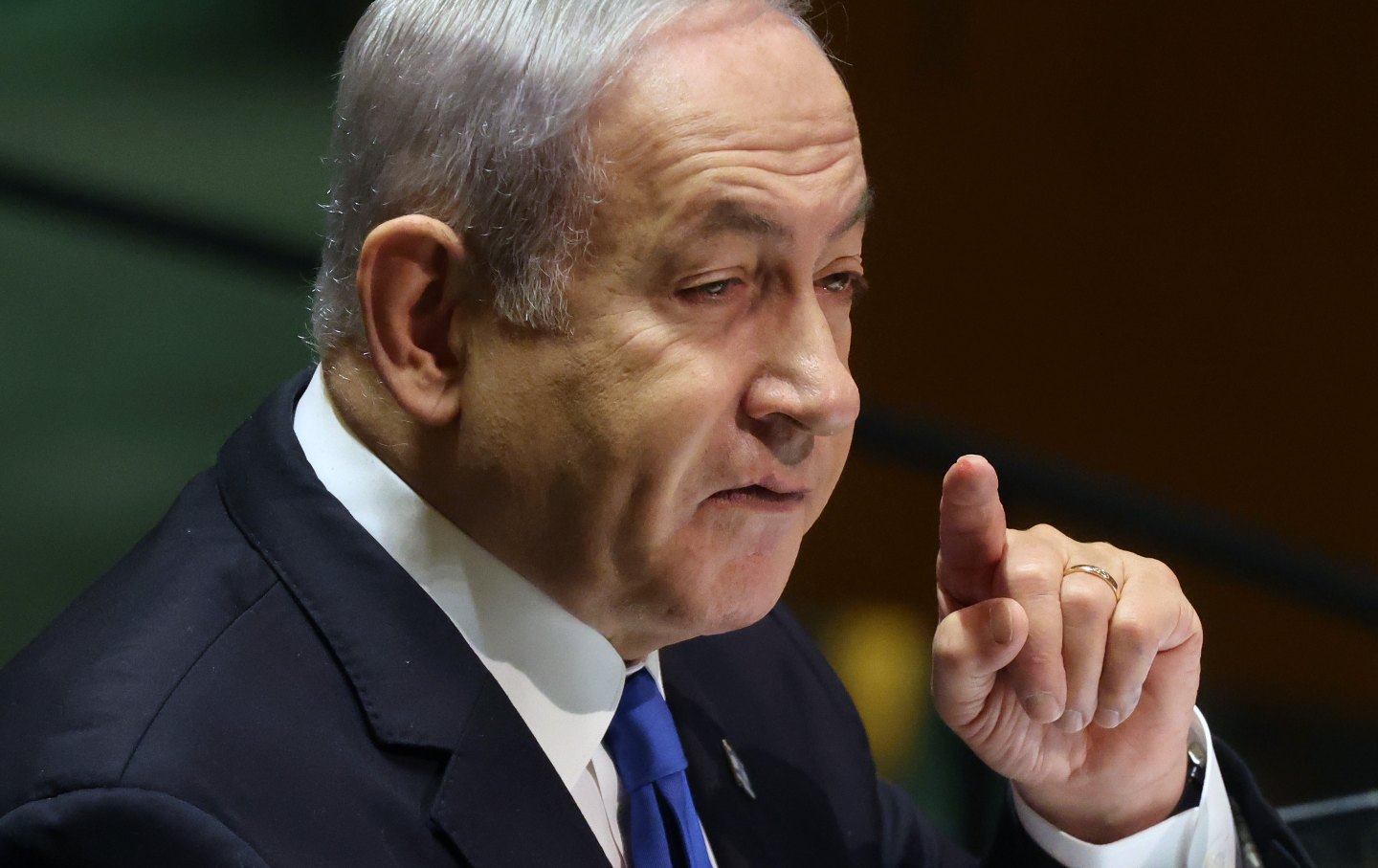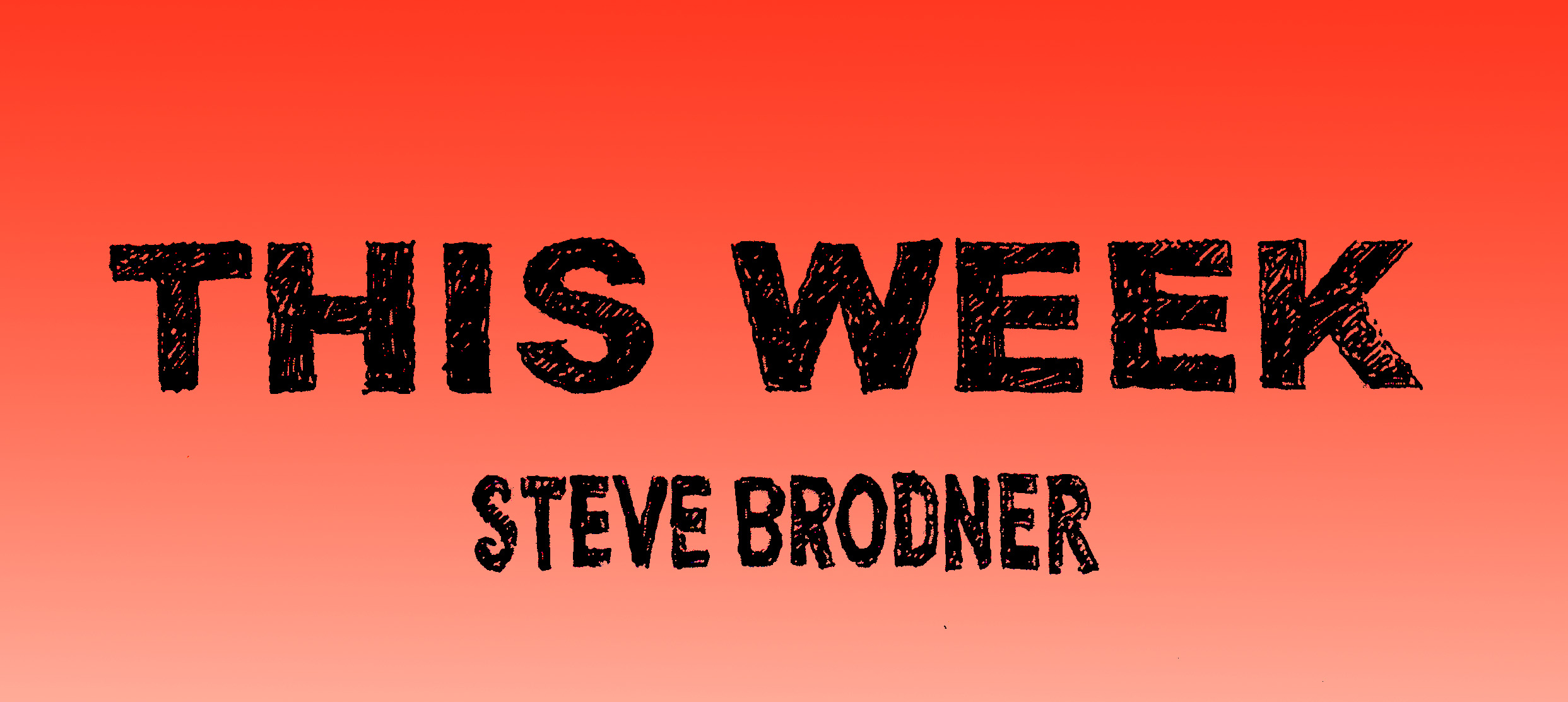/
October 9, 2023
Israel’s Response to Its 9/11 Risks Missing the Lessons of America’s 9/11
Ignoring intelligence failures and doubling down on bad policy is the worst response to terrorism.
Israeli Prime Minister Benjamin Netanyahu addresses world leaders during the United Nations General Assembly on September 22, 2023, in New York City. (Spencer Platt / Getty Images)
For once, a big news event is producing historical analogies that are not hyperbolic but, if anything, understated. Hamas’s brazen incursion into Israeli territory on Saturday, which to date has led to the killing of more than 700 Israelis and 400 Palestinians, was almost immediately compared to Al Qaeda’s terrorist attack on the United States on September 11, 2001. Among American politicians, Representatives Adam Schiff and Ritchie Torres, both Democrats, invoked the memory of 9/11.
By any reasonable measure, the Hamas attack is a much greater trauma for Israel than the 9/11 attack was for the United States. Israel’s population is just over 9 million. The United States had 285 million people in 2001. The United States lost 2,996. In proportional terms, Israel lost more than 20,000 of its citizens. Even so, the Israeli death toll is smaller proportionally than Palestinian causalities in the conflict, which in recent years runs to more than 200 killings per year. The 2014 Israeli Defense Force (IDF) operation in Gaza took the lives of at least 1400 Palestinian civilians.
Current Issue
Beyond the horrendous civilian death toll, Hamas has committed further war crimes by kidnapping civilians. There is also the psychological factor of a surprise attack. As the United States did on 9/11, Israel experienced the assault as a bolt out of the blue—a sudden, unexpected disruption of an orderly society. For the Israeli military, as for the American national security state, the terrorist attack is a humiliation that shatters a once-vaunted reputation for invincibility. It calls to mind the Yom Kippur war of 1973, which took place exactly 50 years earlier and destroyed the reputation of Prime Minister Golda Meir, caught off-guard by the invasion by Egypt and Syria. Meir resigned the year after the war.
If Prime Minister Benjamin Netanyahu is thinking in historical terms at all, he must be contemplating how to avoid Meir’s fate and achieve what George W. Bush pulled off after 9/11. After all, just as Netanyahu has recently been a prime minister under siege for his widely resisted attempt to overhaul the courts—not to mention his long-simmering trial on charges of bribery and corruption—Bush was also a floundering president. The 9/11 attack was a godsend for Bush’s presidency, even as it was a curse for the United States. His presidency went from feckless to consequential—in fact, even world historical.
White House chief of staff Andrew Card whispers to President George W. Bush news that two planes have crashed into the World Trade Center, on September 11, 2001. (Doug Mills / AP Photo)
Practically overnight, Bush was recast as an heroic leader, given a blank check by Congress to run roughshod over civil liberties with the Patriot Act, to pioneer new forms of incarceration and torture at Guantánamo Bay, to launch invasions of two countries and make the United States the spearhead of a Global War on Terror. We’re still living in the shadow of Bush’s decisions, which led to mass torture, a global refugee crisis, and the deaths of hundreds of thousands of civilians.
There’s already an impulse in Israeli politics (echoed in the United States and elsewhere) to give Netanyahu the same blank check Bush had. Former Republican representative Joe Walsh, a Never Trump Republican, tweeted, “Yesterday was Israel’s 9/11. And remember, after 9/11, nobody told the United States not to retaliate, nobody called for a ‘ceasefire’ or a ‘de-escalation,’ nobody ‘both-sided’ what had happened that horrible day.”
Surely, the lesson of 9/11 is not that you should give unconditional support to a government that has an escalatory military response to terrorism. Former Greek finance minister Yanis Varoufakis had a wiser response. He tweeted,
The shock and fury in Israel are reminiscent of the emotions in the US after 9/11. That provoked a display of American unity and power. It also led to a misconceived and self-destructive war on terror. Israel may be heading down the same dangerous path.
Sentiments like Walsh’s, in Israel and among its allies, will help Netanyahu shore up his power. He’s already on that path, forming an emergency government and declaring war. The IDF has already launched attacks on Gaza, laying the groundwork for what could be a scorched-earth destruction of Hamas.
At some point, Israel’s opposition parties will have to decide whether to hold Netanyahu accountable fo the disastrous attacks on his watch. At the very least, the surprise attack is a massive failure by the IDF, the Mossad, and Shin Bet.
After 9/11, Susan Sontag wrote an extremely unpopular essay for The New Yorker that spoke hard truths few at the time were ready to hear. Sontag asked, “Where is the acknowledgment that this was not a ‘cowardly’ attack on ‘civilization’ or ‘liberty’ or ‘humanity’ or ‘the free world’ but an attack on the world’s self-proclaimed superpower, undertaken as a consequence of specific American alliances and actions? How many citizens are aware of the ongoing American bombing of Iraq?” She added, “Let’s by all means grieve together. But let’s not be stupid together. A few shreds of historical awareness might help us understand what has just happened, and what may continue to happen.” For her trouble, Sontag was denounced as an “America-hater” and “traitor.”
Sontag’s call for an intelligent response to 9/11 remains bracing. It’s a call to think about the root causes of terrorism, to hold governments responsible for security failures, and to look at the reality of foreign policy squarely, not through the haze of patriotic mythology.
The intellectual courage of Susan Sontag remains as rare as hen’s teeth. It can be detected in an editorial in Haaretz on the causes of this catastrophe:
The disaster that befell Israel on the holiday of Simchat Torah is the clear responsibility of one person: Benjamin Netanyahu. The prime minister, who has prided himself on his vast political experience and irreplaceable wisdom in security matters, completely failed to identify the dangers he was consciously leading Israel into when establishing a government of annexation and dispossession, when appointing Bezalel Smotrich and Itamar Ben-Gvir to key positions, while embracing a foreign policy that openly ignored the existence and rights of Palestinians.
Netanyahu will certainly try to evade his responsibility and cast the blame on the heads of the army, Military Intelligence and the Shin Bet security service who, like their predecessors on the eve of the Yom Kippur War, saw a low probability of war with their preparations for a Hamas attack proving flawed.
They scorned the enemy and its offensive military capabilities. Over the next days and weeks, when the depth of Israel Defense Forces and intelligence failures come to light, a justified demand to replace them and take stock will surely arise. However, the military and intelligence failure does not absolve Netanyahu of his overall responsibility for the crisis, as he is the ultimate arbiter of Israeli foreign and security affairs.
Haaretz is no more likely to be heeded than Sontag was. Yet its call for holding Netanyahu and his government accountable and for honesty about the dispossession of the Palestinians points to the only way forward that doesn’t unleash more horrors.
Jeet Heer
Jeet Heer is a national affairs correspondent for The Nation and host of the weekly Nation podcast, The Time of Monsters. He also pens the monthly column “Morbid Symptoms.” The author of In Love with Art: Francoise Mouly’s Adventures in Comics with Art Spiegelman (2013) and Sweet Lechery: Reviews, Essays and Profiles (2014), Heer has written for numerous publications, including The New Yorker, The Paris Review, Virginia Quarterly Review, The American Prospect, The Guardian, The New Republic, and The Boston Globe.
More from
Jeet Heer
Cornel West and RFK Jr. Are Both Helping Biden Now
Cornel West and RFK Jr. Are Both Helping Biden Now
As two of his rivals head into the wilderness, the president is consolidating the left-of-center vote.
Congress Hits the Snooze Button to Stop Shutdown—for 45 Days
Congress Hits the Snooze Button to Stop Shutdown—for 45 Days
Democrats temporarily bailed out flailing GOP House Speaker Kevin McCarthy, but underlying chaos remains.
Senator Menendez Is Just the Latest Sucker to Fall for Fool’s Gold
Senator Menendez Is Just the Latest Sucker to Fall for Fool’s Gold
While most celebrity goldbugs are on the far right—Steve Bannon, Glenn Beck, Candace Owens, Ron Paul…—Democrats are not immune from the strange charms of this economic delusion.
Why the Mainstream Media Loved Trump’s Fake Pro-Workers Rally
Why the Mainstream Media Loved Trump’s Fake Pro-Workers Rally
A combination of horse race journalism and anti-union bias led to absurd reporting.
Rupert Murdoch’s Final Con Game
Rupert Murdoch’s Final Con Game
Announcing his exit, the right-wing baron mixes public populism and private elitism.
Did Narendra Modi Kill a Canadian Citizen?
Did Narendra Modi Kill a Canadian Citizen?
New cold war politics might end any investigation into the assassination of a Sikh activist before it begins.


